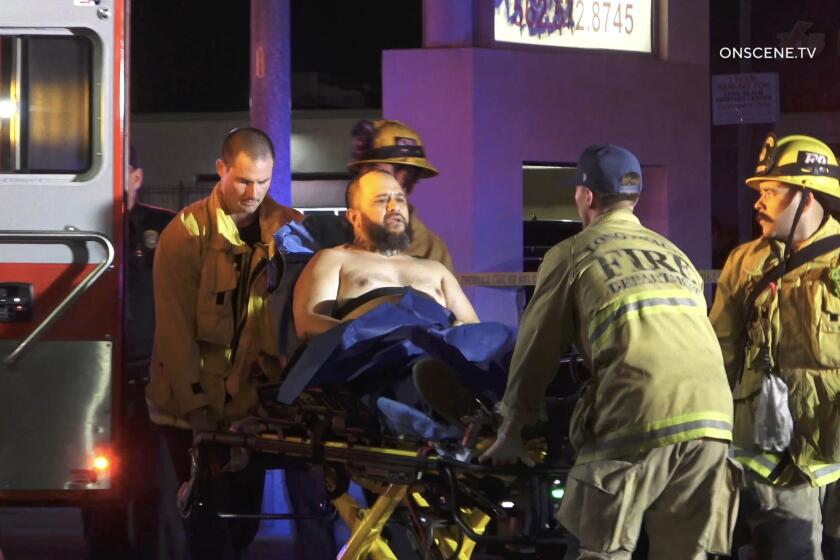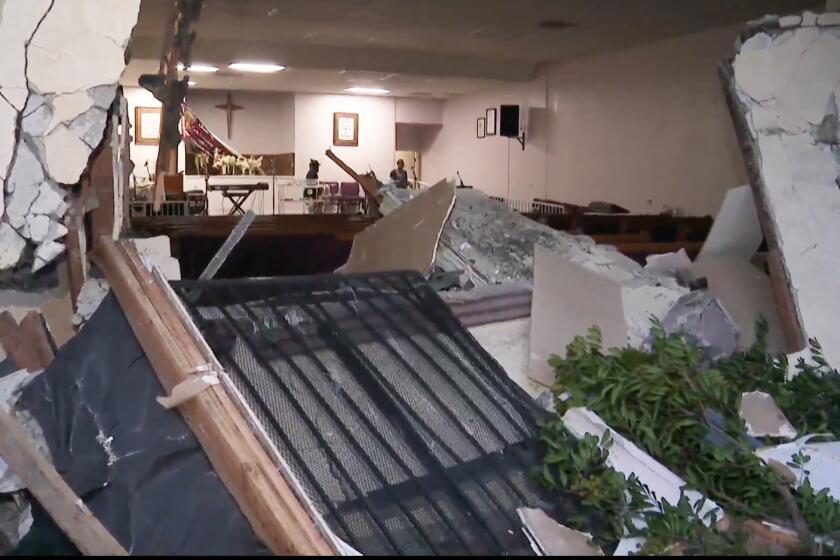‘I am not a therapist, I am a town crier’
Ashley Walker-Hooper has been battling domestic violence since before most people even knew it existed. The 41-year-old Normal Heights resident is director of special programs at San Diego’s downtown YWCA. She oversees the staff, administration and fiscal aspects of several programs, including the Y’s Battered Women’s Services, which provides legal services and counseling for women, men and children. Walker-Hooper has published articles and delivered more than 500 lectures on domestic violence in addition to teaching classes on the subject at the Sheriff’s Academy. In March, she was named “Woman of the Year” by the Alvarado Parkway Institute, a psychiatric hospital. One of the first black female graduates of John Carroll University in Cleveland, she also is a partner in a management consulting company. Times staff writer Kimberly Luoma interviewed Walker-Hooper in her downtown office and Bruce K. Huff photographed her.
I oversee Creative Visitation, a program that allows people who lose custody of their children a chance to see them in a supervised environment, and the San Ysidro Youth Services, which is a dropout prevention program and a recreation program. I came aboard to set up the Shelter for Battered Women in 1978. It’s really strange, because before 1976 there was not even a word or a term for domestic violence; we didn’t even know anything about it.
When men beat up women or when women beat up men, it was just a personal, private thing. So, the first time I heard of intra-family violence, I had no idea what that was. In 1989 we’re still at the point of having people acknowledge that it happens.
I don’t deal very much one-on-one with women. I am not a therapist, I am a town crier. I am the person who asks the questions or makes the statements that no one else makes, but everyone is thinking in their head. It’s a kind of strange position to be in. I’ve been talking about domestic violence for a lot of years, before it was sexy, before it was popular. Because when you say one in two women are beaten by someone they love during their intimate lifetime, most people still don’t believe that. People are having a real hard time with that because if they know something about it, then one might think it’s them.
I’ve been talking about empowerment of people, of women and children. I ask questions that need to be asked, even if no one has the answer, even if it makes everybody else angry, and I ask them anywhere they need to be asked. I like the idea of stimulating thought, of stimulating conversation and of asking people to revisit their values and revisit their attitudes about women, about kids, about blacks, about me.
When I’m in a discussion with someone at the YW about racism, and our one imperative is to thrust our collective power towards the elimination of racism wherever it exists and by any means necessary, it is a difficult conversation. You walk up to someone and you start talking about racism and all kinds of assumptions are made about what you’re saying about them, and people get really defensive. But if you don’t ask the questions, people can never really examine who they are, what they are, what they think, or why they think it.
For me, the enjoyment of life does entail an element of risk. That’s why I will always be out there, pushing against something or moving something or questioning something. I think making people aware, making people not be able to sleep at night, and putting it on their minds is what I do best.
It’s difficult sometimes. But, it’s been really rewarding for me because I’ve accomplished something that most people never do in their whole lifetime. Most people live their whole lives and never know that what they’ve done made a difference. So I’ve been extraordinarily lucky because I know that what I’ve done in 10 years has changed people’s lives, has changed systems and has made things better.
And it’s kind of a strange place to be at 40, because I’m now having to reexamine and find something else to do. I don’t expect to be doing this in 10 years; I may not be doing this in one year. It’s time to be about other things. It’s been wonderful. It’s done great things for me, and I’ve done great things for it.
More to Read
Start your day right
Sign up for Essential California for news, features and recommendations from the L.A. Times and beyond in your inbox six days a week.
You may occasionally receive promotional content from the Los Angeles Times.





